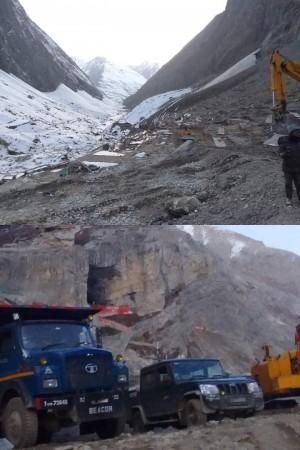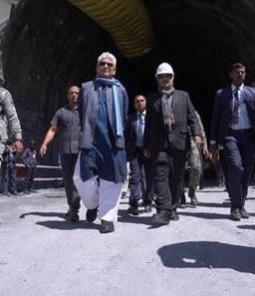The Border Roads Organisation (BRO) ultimately started the work to widen the Amarnath Yatra routes from Pahalgam and Sonamarg.
Border Roads personnel have created history with the first set of vehicles recently reaching the holy Amarnath cave.
BRO tasked with the road widening work on the Amarnath cave routes, announced the completion
of the formidable task.

"Project Beacon is involved in the restoration and improvement of Amarnath Yatra tracks. Border Roads personnel completed the formidable task and created history with the first set of vehicles reaching the holy cave," BRO announced in a post on X.
Giving further details, an official of the BRO said they took a truck and small pickup vehicle from Dumail in Ganderbal district to the Amarnath Cave via Baltal base camp, which is one of the two routes to reach the cave.
He said BRO used these vehicles for the ongoing work near the holy cave of Amarnath.
"The vehicles had gone at the cave because we have to carry a lot of stores as we have to do a lot of the permanent work," he said. "And yes, it has been a great achievement for the BRO because, in a very short time, we could reach there. We employed our resources because our aim was to reach there before the snowfall."
Pahalgam, Sonamarg tracks to be widened by BRO
The Amarnath yatra routes through Pahalgam and Sonamarg will be widened with railings by the BRO.
Reports said that BRO has deployed machines and teams to start the work.
The officer said right now, widening of the nearly 13-kilometer road stretch has been done till the cave from the Sangam base and Sangam top road via Baltal. The road to Amarnath would reduce the travel time for pilgrims.

Gadkari already announced a project for Amarnath devotees
In April this year, Union minister Gadkari said that tenders for the Rs 5,300 crore project announced for the Amarnath pilgrimage likely by year-end; will bring travel time from Srinagar down from three days to seven-eight hours.
Nitin Gadkari had announced a Rs 5,300 crore project for the widening of a 110-km long national highway into a four-lane road from Khannabal to Chandwanwari and further construction of uphill tracks and tunnels to the cave shrine nestled amidst the Himalayas.
Upon completion, the project is tipped to bring down the travel time between Srinagar to the cave shrine to 7 to 8 hours. Presently, it takes three days to cover the stretch via the traditional route of Chandanwari.
The project also would cover a 34-km long two-lane track from Chandwari to Panchtarni to Baltal, to be constructed at a cost of Rs 3,500 crore, and a 10.8-km long tunnel from Sheshanag to Panchtarni.
For the 5-km distance from Panchtarni to the holy cave shrine, a 5.5-m broad concrete pedestrian track with barricades on either side will also be constructed.
The construction of a 9-km long ropeway over the shorter route from Baltal to the cave shrine at Rs 750 crore was also announced.

















